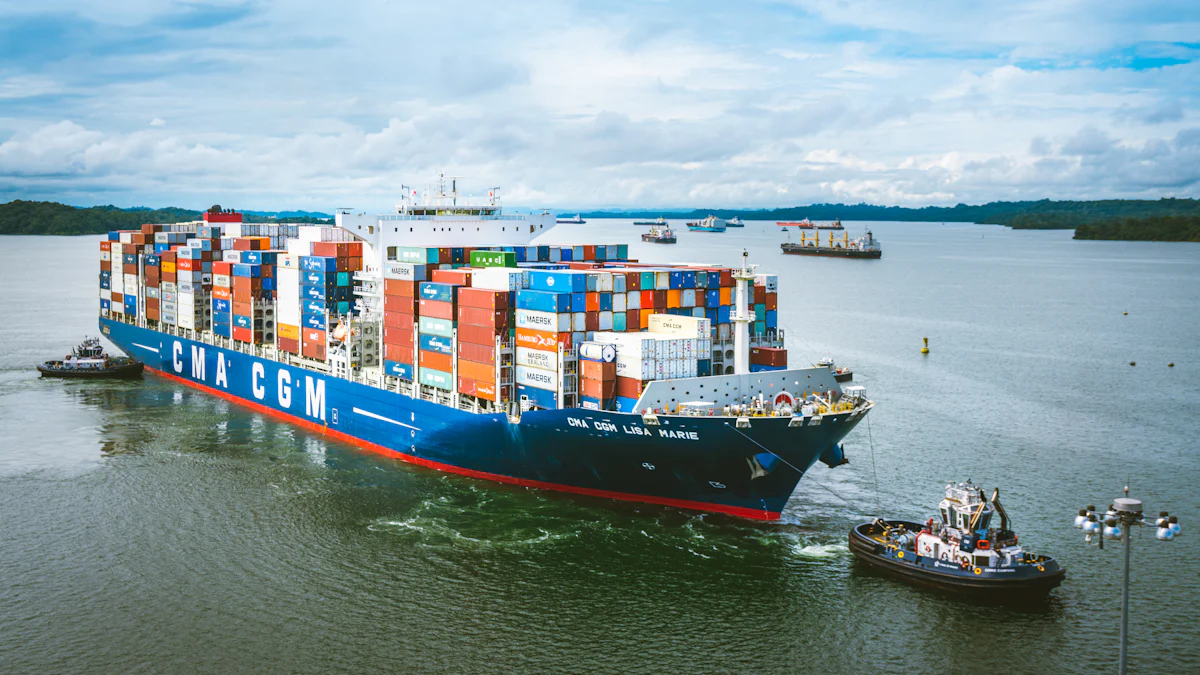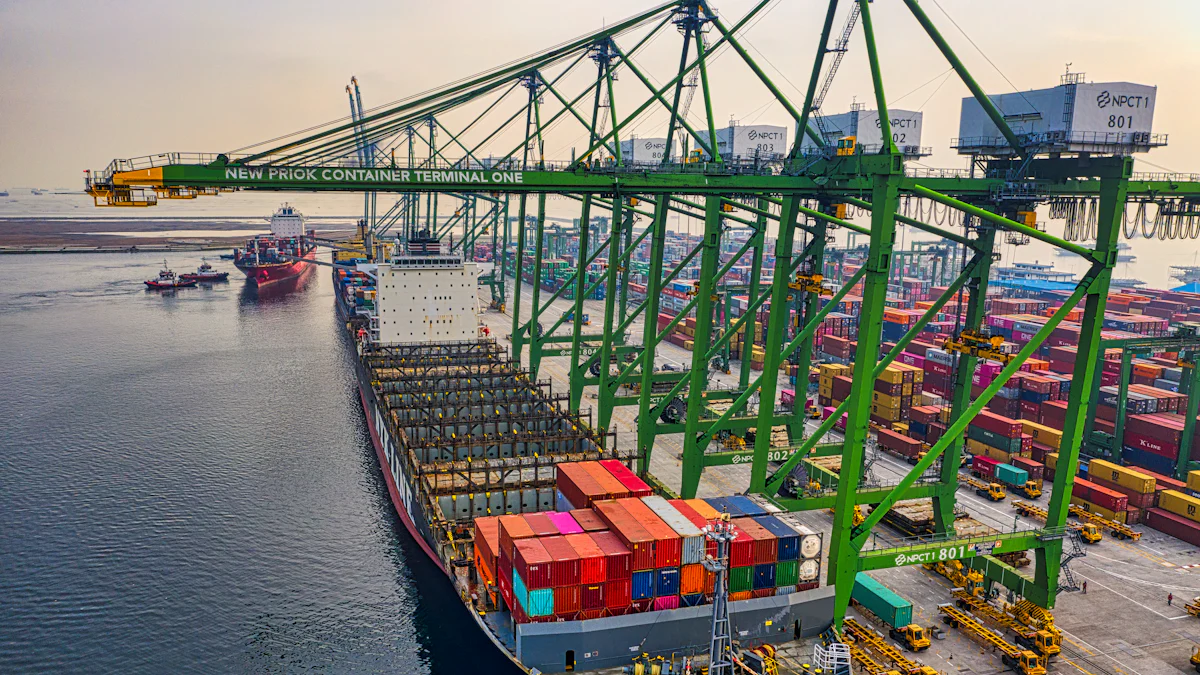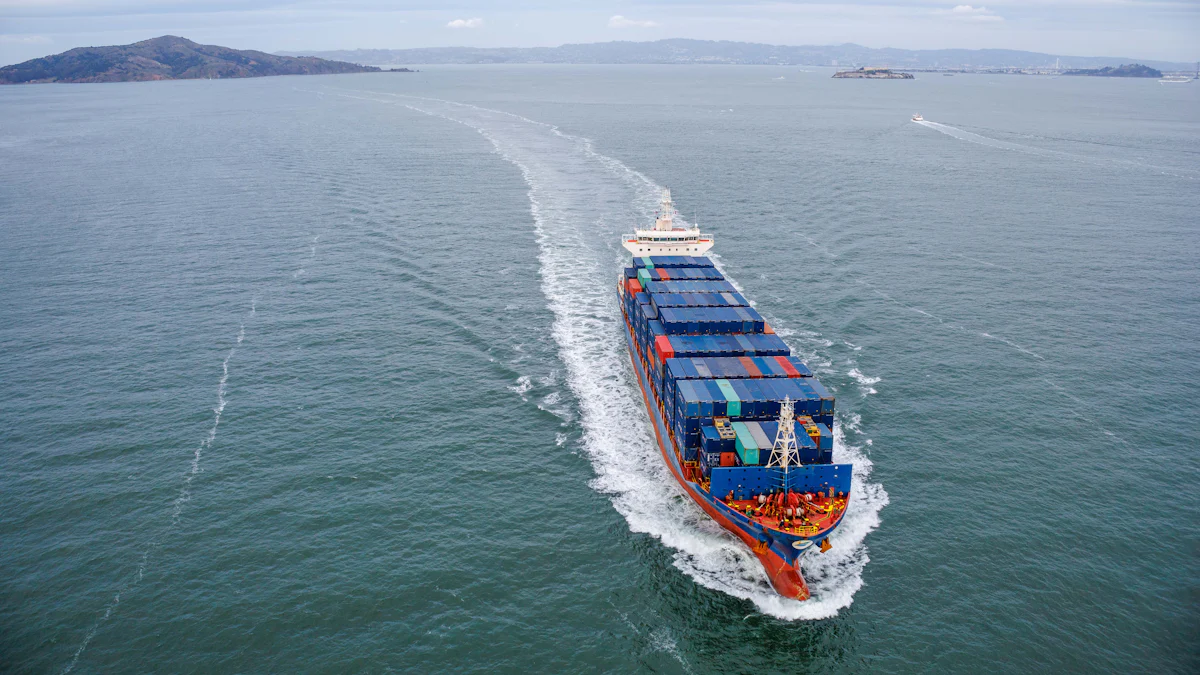The Pros and Cons of Sea Freight Shipping

Sea freight plays a crucial role in global trade, moving approximately 80% of the world's goods. This method of sea freight shipping enables businesses to transport their goods efficiently across continents. Sea freight not only supports the movement of *1.95 billion metric tons of cargo annually* but also offers a cost-effective solution for large-scale logistics. Its environmental impact is relatively lower, contributing just 3.1% of global CO2 emissions. For companies seeking reliable sea freight services, this mode of transport remains an indispensable choice to meet growing demands and expand their reach.
Advantages of Sea Freight Shipping

Cost-Effectiveness of Sea Freight
Sea freight stands out as a highly cost-effective solution for businesses aiming to minimize transportation expenses. Compared to air freight, maritime shipping offers significantly lower costs, especially for large shipments. For instance, transporting goods by sea can be up to 16 times cheaper than air freight. This affordability makes it an ideal choice for companies handling bulk goods or operating on tight budgets.
"Ocean freight is often up to five times cheaper than air freight for moving large volumes of cargo."
The economies of scale achieved through ocean freight transportation further enhance its cost-effectiveness. Cargo ships can carry vast quantities of goods in a single voyage, reducing the per-unit shipping cost. This advantage proves invaluable for industries dealing with heavy or oversized items, ensuring affordability without compromising efficiency.
High Capacity and Flexibility in Ocean Freight Transportation
Ocean freight transportation excels in accommodating large and heavy goods. Cargo ships are designed to handle substantial loads, making them suitable for transporting everything from industrial machinery to construction materials. This high capacity ensures that businesses can transport their goods efficiently, regardless of size or weight.
Moreover, maritime shipping offers remarkable flexibility in handling diverse cargo types. From standard containers to specialized shipments like hazardous materials, ocean freight services cater to a wide range of needs. This adaptability makes maritime freight services a preferred choice for industries requiring tailored solutions to transport their goods safely and reliably.
Environmental Benefits of Sea Freight
Maritime shipping contributes significantly to environmental sustainability. It produces lower carbon emissions per ton-mile compared to air freight, making it an eco-friendly option for global trade. For businesses prioritizing green logistics, ocean freight transportation aligns with their sustainability goals.
Advancements in eco-friendly shipping technologies further enhance the environmental benefits of maritime freight services. Innovations such as fuel-efficient engines and cleaner energy sources reduce the ecological footprint of maritime operations. By choosing affordable maritime shipping, companies not only save costs but also support efforts to protect the planet.
Global Reach with JUSDA’s Ocean Freight Solutions
Ocean freight transportation opens doors to international markets, enabling businesses to expand their reach across continents. Established shipping routes form the backbone of global trade, ensuring the seamless movement of goods between countries. These routes connect major ports worldwide, providing businesses with reliable access to international markets. Companies can leverage this extensive network to transport their goods efficiently and cost-effectively.
JUSDA enhances this global connectivity through its comprehensive ocean freight services. With a presence in over 155 service points and access to ports in most countries, JUSDA ensures that businesses can navigate the complexities of maritime shipping with ease. Their solutions cater to diverse industries, offering tailored services that align with specific logistics needs. By utilizing JUSDA’s expertise, businesses can streamline their supply chain operations and maintain a competitive edge in the global market.
"JUSDA’s JusLink platform optimizes supply chain management, providing real-time insights and risk management for efficient operations."
The availability of ports in most countries further strengthens the reliability of maritime freight services. Businesses can rely on this accessibility to ensure timely delivery of goods, even in remote regions. This global reach makes ocean freight transportation an indispensable choice for companies aiming to scale their operations and meet the demands of international trade.
Security and Reliability in Sea Freight
Maritime shipping offers a high level of security and reliability, making it a preferred choice for transporting valuable goods. Advanced tracking systems play a crucial role in ensuring cargo safety. These systems provide real-time monitoring, allowing businesses to track their shipments throughout the journey. This transparency minimizes the risk of misplacement and enhances customer confidence in the shipping process.
The lower risk of theft in ocean freight transportation further adds to its reliability. Cargo ships operate under strict security protocols, reducing the likelihood of unauthorized access. Additionally, the use of sealed containers ensures that goods remain protected during transit. This level of security is particularly beneficial for industries dealing with high-value or sensitive items.
JUSDA takes security and reliability to the next level with its innovative solutions. Their JusLink platform integrates advanced technologies to provide end-to-end visibility and control over the supply chain. Businesses can monitor their shipments in real time, address potential risks proactively, and ensure the safe delivery of goods. By choosing JUSDA’s maritime freight services, companies can achieve peace of mind while optimizing their logistics operations.
Disadvantages of Sea Freight Shipping

Slower Transit Times in Ocean Freight Transportation
Ocean freight transportation often requires extended delivery times, making it less suitable for businesses with urgent shipping needs. Unlike air freight, which can deliver goods within days, maritime shipping may take weeks to complete a single journey. This slower pace stems from the nature of maritime operations, where vessels traverse vast distances across oceans.
For time-sensitive shipments, this delay can pose significant challenges. Businesses relying on just-in-time inventory systems may find it difficult to align their schedules with the prolonged transit times of ocean freight transportation. The slower speed of maritime shipping highlights the importance of planning ahead to mitigate potential risks associated with delayed deliveries.
Potential Delays in Sea Freight
Maritime shipping faces various external factors that can disrupt schedules and cause delays. Weather-related disruptions, such as storms, hurricanes, or rough seas, frequently impact the journey of cargo ships. These natural events can force vessels to alter their routes or remain docked until conditions improve, delaying the delivery of goods.
Port congestion also contributes to delays in ocean freight transportation. During the COVID-19 pandemic, global ports experienced closures and labor shortages, leading to significant backlogs. For example, major container ship operators reported schedule reliability below 40% throughout most of 2021. Customs clearance processes further exacerbate these delays. Insufficient customs resources or complex regulations can slow down the movement of goods, creating bottlenecks at ports.
"The Suez Canal blockage in March 2021 serves as a stark reminder of how unforeseen events can disrupt maritime shipping. The incident delayed countless shipments and increased transportation costs globally."
These potential risks emphasize the need for businesses to account for unexpected delays when choosing maritime shipping as their preferred mode of transport.
Additional Costs in Ocean Freight
While ocean freight transportation is often considered a cost-effective solution, additional expenses can arise during the shipping process. Port fees, customs duties, and insurance costs add to the overall expenditure, potentially impacting the affordability of maritime shipping. These charges vary depending on the destination, cargo type, and regulatory requirements.
Demurrage charges represent another financial risk for businesses. If cargo remains at the port beyond the allotted free time, companies may incur penalties for storage. This situation often occurs due to delays in customs clearance or logistical inefficiencies. Businesses must carefully manage their supply chain operations to avoid these extra costs and ensure smooth delivery of goods.
By understanding these challenges, businesses can better prepare for the complexities of maritime shipping. Proper planning and collaboration with reliable logistics partners can help mitigate potential risks and optimize the efficiency of ocean freight transportation.
Risk of Damage or Loss in Sea Freight
Maritime shipping, while reliable, carries potential risks that businesses must consider. One significant concern involves the exposure of goods to rough seas and handling risks. Cargo ships often navigate through unpredictable weather conditions, including storms and high waves. These harsh environments can lead to physical damage to containers or their contents. Fragile items, in particular, face a higher likelihood of breakage during transit. Proper packaging and securing of goods remain essential to minimize these risks.
The possibility of container misplacement or accidents also poses challenges in maritime freight. With thousands of containers loaded onto a single vessel, errors in handling or documentation can result in misplaced shipments. Accidents, such as collisions or grounding incidents, further increase the risk of cargo loss. For instance, the infamous Suez Canal blockage in 2021 highlighted how unforeseen events could disrupt maritime operations and jeopardize the safety of goods. Businesses must adopt robust tracking systems and collaborate with experienced logistics providers to mitigate these risks effectively.
Environmental Concerns in Ocean Freight Transportation
Maritime shipping significantly impacts the environment, raising concerns about its long-term effects on ecological systems. One major issue involves marine pollution caused by oil spills or waste discharge. Accidental oil spills from vessels can devastate marine ecosystems, harming aquatic life and contaminating water sources. Improper disposal of waste materials, including plastics and chemicals, further exacerbates this problem, threatening biodiversity in oceans.
Shipping activities also contribute to air pollution, affecting both environmental sustainability and human health. According to studies, ships emit pollutants such as sulfur oxides (SOx), nitrogen oxides (NOx), and particulate matter (PM) within 400 kilometers of shorelines. These emissions not only degrade air quality but also increase the risk of respiratory issues for nearby populations. Additionally, the release of carbon dioxide (CO2) from maritime operations contributes to global warming, challenging efforts to combat climate change.
The impact of maritime shipping on marine ecosystems cannot be overlooked. Noise pollution from ship engines disrupts the natural behavior of marine animals, including whales and dolphins. Habitat destruction caused by anchoring and dredging further threatens the delicate balance of underwater environments. To address these concerns, the industry must invest in cleaner technologies and adopt sustainable practices that prioritize environmental preservation.
Sea freight shipping provides businesses with a cost-efficient and reliable way to transport your goods across the globe. Its ability to handle large cargo volumes, coupled with its eco-friendly nature, makes maritime shipping a preferred choice for many industries. However, slower transit times and potential delays require careful planning. By evaluating these factors, businesses can decide if maritime shipping aligns with their logistics goals. JUSDA’s tailored maritime solutions simplify complex supply chain challenges, ensuring businesses achieve seamless global trade while maintaining efficiency and reliability.
See Also
Exploring Innovations in Sea Freight Logistics for 2024
In-Depth Look at the Future of LTL Freight
Understanding Current Trends in Logistics Risk Management
A Complete Overview of Global Logistics Firms Today
Mastering Lean Logistics for Success in High-Tech Manufacturing
